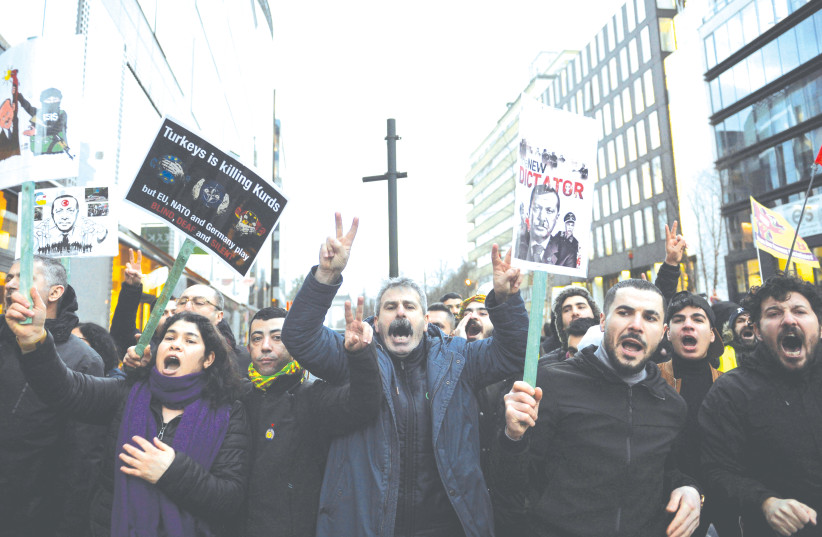The Erdoğan vision is to recreate the period of Turkish and Ottoman greatness.
MICAH HALPERN

Mustafa Kemal Ataturk was the founder of modern-day Turkey. Now, almost 100 years after serving as the first president of the Republic of Turkey, Ataturk is having a resurrection – of sorts.
Turkish President Recep Tayyip Erdoğan thinks he is the new Mustafa Kemal Ataturk.
Erdoğan is trying to regain lands and restore Turkey to greatness. If he has his way, he will restore his country’s heritage even further back in history. He revels at the thought of restoring Turkey’s influence to the position it held during the Ottoman Empire, and even earlier, to the period of the Seljuk Empire, the powerful Turkish-Persian Sunni ruling federation of the 11th-14th centuries.
Erdoğan is expanding Turkey. He is laying claim to territories, waters and oil rights that include the Eastern Mediterranean. The Turkish Army has invaded parts of Iraq and Syria. Some of these claims, such as the conflict with Greece, have been covered in the international media. Most others have not.
A map recently circulated on Twitter by Metin Kulunk, one of Erdoğan’s closest political associates, offers proof of Turkey’s expansive objectives and territorial claims. On the Erdoğan map, Turkey spans areas far more vast than the territory it now holds. The map includes northern Greece through to the eastern Aegean Islands, half of Bulgaria, all of Cyprus, most of Armenia and large swaths of Georgia, Iraq and Syria.
The Erdoğan vision is to recreate the period of Turkish and Ottoman greatness.
The map was originally tweeted on August 26. The date is significant. It is the anniversary of the Battle of Manzikert that took place in 1071. It was the battle that led to the eventual defeat of the Holy Roman Empire. The battle was the beginning of the fall of the Holy Roman Empire and the start of the emergence of the Ottoman Empire. The significance of this transitional period in history is best realized in the change of names. In 1453 Constantinople, the capital city of Turkey was renamed Istanbul.
cnxps.cmd.push(function () { cnxps({ playerId: ’36af7c51-0caf-4741-9824-2c941fc6c17b’ }).render(‘4c4d856e0e6f4e3d808bbc1715e132f6’); });
In Erdoğan’s world view, an equivalent of the original Holy Roman Empire exists today, and that equivalent is none other than the United States and her ally Israel. Erdoğan is positioning himself and his country to fill what he sees as an extremely important power gap. He wants to oust today’s equivalent Holy Roman Empire and occupy that position himself.
FOR THE Turkish president, this happens in stages. He is filling power voids left by Iran. As Iran falters on the international stage, because of the COVID-19 pandemic and because of the crippling effect US-led sanctions are having on the Iranian economy, Turkey is stepping in. Erdoğan has championed the cause and is taking the place once held by Iran as leader of the bulwark against the West.
This week, for example, a gas deal was signed between a US company and the Syrian Democratic Forces, a Kurdish group that controls a section of Syria that has significant and untapped oil reserves. Turkey, along with Iran and Russia, condemned the agreement. Turkey has told the United States repeatedly to get out of Syria. Declaring that the United States is an outsider, all three condemning countries echoed his point. They did not, of course, see the irony in that each one of these countries also has a significant presence in Syria.
Recently, Erdoğan hosted the Hamas leadership in Istanbul. During their meeting, as was first reported by The Jerusalem Post, Erdoğan gifted Hamas leaders with Turkish citizenship and a prized Turkish passport. Knowingly issuing a Turkish passport, a European Union passport, to known and wanted international terrorists is nothing short of sponsoring terrorism. These coveted travel documents will be used to raise money that will unquestionably finance the planning and execution of murderous terrorist attacks against civilians in Israel.
Erdoğan is an extremely effective leader. He created an Islamic party that ousted the security and military caste that had effectively checked Islamic extremism. Over the years, Erdoğan has become increasingly Islamist and increasingly more extremist. The move is apparent in his growing disdain for the West, and especially clear in his attitude toward the United States and Israel.
Despite serious economic troubles at home, Erdoğan is a leader on the move. Invoking images of the Seljuk Empire and Ataturk, coupled with his unabashed defiance of the United States and Israel, strengthens his position within his own country. Erdoğan makes Turks proud of their heritage, proud to be Turkish and the progeny of once great heroes and warriors.
Erdoğan’s vision is in direct conflict with the West. I hope he fails. I think he will fail. His ideology, while it makes people feel good, has resulted in hard economic times. National economic success is dependent on linkage to the United States and Israel. Iran and Russia cannot – will not – pick up the slack. Thus far Erdoğan’s ideology, not his economic interests, has led his decision-making process. But it will only take him so far.
In the end, success is all about economics.
The author is a political commentator and the host of Thinking Out Loud on JBS TV.
Content retrieved from: https://www.jpost.com/opinion/erdoan-believes-he-is-restoring-turkey-to-greatness-is-he-640619.